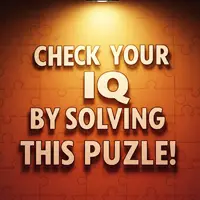The Art and Science of Puzzle Solving.
puzzle
Advertisement
Puzzles have been a part of human culture for centuries, engaging our minds and challenging our problem-solving abilities. From simple jigsaw puzzles to complex mathematical conundrums, solving puzzles is not just a fun activity but also a way to sharpen cognitive skills and enhance critical thinking.
The Importance of Puzzle Solving
Solving puzzles is more than just entertainment—it has significant cognitive and psychological benefits, including:
- Enhancing Problem-Solving Skills: Puzzles require logical reasoning, pattern recognition, and creative thinking to find solutions.
- Improving Memory and Concentration: Regular engagement with puzzles helps enhance memory retention and focus.
- Boosting Patience and Persistence: Many puzzles take time and effort, teaching patience and perseverance.
- Encouraging Creativity: Some puzzles, such as riddles and brainteasers, demand out-of-the-box thinking.
- Reducing Stress: Engaging with puzzles can be a relaxing activity that provides a break from daily stressors.
Types of Puzzles
There are many types of puzzles, each catering to different cognitive skills and interests. Some of the most popular types include:
1. Logic Puzzles
These puzzles require reasoning and deduction to arrive at the correct answer. Examples include Sudoku, nonograms, and logic grid puzzles.
2. Word Puzzles
Word-based challenges improve vocabulary and language skills. Examples include crosswords, anagrams, and word searches.
3. Mathematical Puzzles
These puzzles involve numerical and algebraic thinking. Examples include magic squares, number sequences, and probability problems.
4. Jigsaw Puzzles
These puzzles involve assembling pieces to form a complete picture, improving spatial reasoning and pattern recognition.
5. Riddles and Brainteasers
These are short, tricky problems that require lateral thinking. Classic examples include riddles and paradoxes.
6. Mechanical Puzzles
These involve physical objects that must be manipulated to solve a problem, such as Rubik’s Cube and disentanglement puzzles.
Strategies for Effective Puzzle Solving
If you find yourself stuck on a puzzle, consider these techniques to improve your problem-solving approach:
- Break It Down: Divide the puzzle into smaller parts and tackle them individually.
- Look for Patterns: Identifying recurring patterns can help in finding solutions.
- Think Outside the Box: Be open to unconventional solutions and approaches.
- Practice Regularly: Like any skill, puzzle-solving improves with practice.
- Take Breaks: Stepping away and returning later can provide fresh perspectives.
Conclusion
Puzzle solving is a rewarding mental exercise that sharpens the mind, boosts creativity, and enhances cognitive abilities. Whether you enjoy the logical challenge of Sudoku, the linguistic fun of crosswords, or the strategic depth of chess puzzles, engaging with puzzles regularly can provide both entertainment and mental growth. So pick up a puzzle today and challenge yourself!